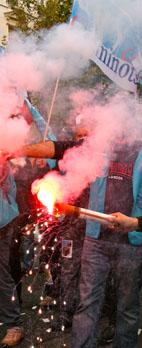The Crisis in France, Richard Greeman
The Class Struggle in France, Larry Portis
The students are revolting - report on the occupation of Millbank Tower
EDF in England. Breast cancer figures spark fresh fears over nuclear power risk, Hinkley Point
Warning! Capitalist Sharks, Richard Greeman
UAW Members Protest 50% Wage Cut at GM Plant, Demand a Vote, Jane Slaughter
The trifecta of civil resistance: unity, planning, discipline, Hardy Merriman
Anti-communism 101. Hijacking history, William Blum
Weimar in Jerusalem, Uri Avnery
Popular Resistance in Palestine. A history of Hope and Empowerment, Mazin Qumsiyeh
WAC - MAAN: From Advice Center to Trade Union, Assaf Adiv
Israel. WAC Maan signs a collective agreement in Musrara Art College in Jerusalem, Michael Rorchberg
Chou Sar ? What Happened in Lebanon ?
How the Lebanese Civil War Continues, Larry Portis
Latin America. Dancing with dynamite, Benjamin Dangl
China. Swimming against the Tide, China Labour Bulletin
China. COC. False Adverting of Disney, China Labour Bulletin
Strikes, suicides and labour activism in China
China. Disney world in which Chinese children ’toil for 76 hours a week’, China Labour Watch
Same Causes, Same Effects?
Economic Crisis and Political Action
Do the same causes always produce the same effects? One is tempted to say so, after taking the precaution of affirming that history never repeats itself entirely.
Just look the economic problems in the formerly industrialized West. Is it so surprising, in the midst of economic “crisis”, that “bailing out” the speculators, companies and institutions worldwide that brought about the Wall Street crash has been the reflex of western governments? Did we expect the politicos and their bosses to admit the internal contradictions of the capitalist system and hand over the keys of economic exploitation and domination to people interested more in social justice than in capital gains? No. Even politicians who wanted to talk tough (necessary to mollify the “people”) like Franklin Roosevelt did in 1933 have elected (or were constrained) to emulate the behavior of Herbert Hoover during his fatal presidency (1929-1933).
It’s a case of the same causes producing the same effects.
This is also true of the demonstrations in Greece, France, Italy, Ireland and almost everywhere. When folks lose their income, their purchasing power, their savings, their present and future security, when they cannot pay to go to school, or cannot make ends meet period, they get angry and go out into the streets. And then their reactions become a cause. Their attempts at direct action cause them to be bludgeoned, gassed, arrested and maybe even shot. But this direct action will have its effects, either in the emergence of a popular social movement or in that of some authoritarian turn, undoubtedly both. These developments, too, have the same causes.
Yet there cannot be, or should not be, fatalism in our perceptions and considerations of these dramatic times. The failings of economic and political systems and institutions are prologues to any and all progressive changes to come. The essential, dynamic ingredient is the collective human will to vanquish the forces—productive, institutional and human—that have caused the present misery and insecurity. History has been, and can be again, changed by human action that is both practically utopian and pragmatically idealistic.




